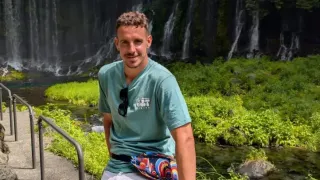October 3, 2014
UCSF Clinic Opens to Provide PrEP
Kilian Melloy READ TIME: 5 MIN.
A new clinic has opened at UCSF aimed at providing a once-a-day pill to prevent the transmission of HIV to those wishing to take it.
Called the Sexual Health Initiative Program, or SHIP for short, it is housed within the university's 360: The Positive Care Center at its Parnassus Heights campus. Since opening its doors in April, the clinic has seen more than 40 patients interested in starting on PrEP, or pre-exposure prophylaxis, in order to remain HIV-negative.
"We are asking about people's sexual health goals and how PrEP fits into the picture," explained Dr. Malcolm John, director of the 360 clinic and the medical director for SHIP. "PrEP is an entrance to a greater discussion on men's sexual health in the gay community."
The Food and Drug Administration approved Gilead Sciences' Truvada (tenofovir plus emtricitabine) for PrEP in July 2012. Studies have shown that when used consistently, once-daily Truvada reduces the risk of HIV infection by more than 90 percent.
In May the Centers for Disease Control and Prevention recommended that people at substantial risk should consider PrEP to prevent HIV infection, and the World Health Organization also recently recommended PrEP as an option for at-risk gay men.
San Francisco resident Craig Souza, 44, sought out services at SHIP three months ago and started taking PrEP. Already receiving his primary medical care through UCSF, Souza learned about the new clinic during a visit to an urgent care clinic.
"I don't even know how the topic came up. I told her I was HIV-negative and she asked me have you heard about PrEP," recalled Souza, who works in high-tech sales. "It was something I had been reading about."
Last year, Souza's decade-long relationship with his boyfriend came to an end and he found himself back in the dating pool. He was surprised to find not only were men in their 20s hitting on him, but many were HIV-positive.
"It was clear to me something was changing around safe-sex practices," he said. "When I think back to being 18 years old at UC Santa Cruz, guys were drilling a condom every time message into our heads."
In deciding to start PrEP, Souza said he did so not to abandon using condoms but in order to not be worried about HIV transmission during sex.
"For me, I see Truvada not as a way to not use condoms but as a backstop," said Souza, who takes the pill as part of a nightly regimen before bed. "I didn't realize it until I started taking Truvada, but every time I had sex since I was 18 there was a voice in the back of my mind saying 'What if?' For the first time ever that voice isn't there anymore and it is kind of nice."
According to preliminary 2014 National HIV Behavioral Surveillance data, among the 130 gay and bisexual men in San Francisco who have taken part in the survey to date, 82 percent of the HIV-negative participants had heard of PrEP. When asked if PrEP was shown to be effective would they take it, more than 51 percent said they were willing to, said H. Raymond Fisher, class=st>DrPH, the deputy director of surveillance at the city's Department of Public Health.
Unmet Need
As interest in PrEP has steadily increased, UCSF officials saw there was an unmet need in the community in terms of where people wanting to start on the drug could access it. Thus, it was important to open SHIP, said Dr. Robert Grant, a physician and the clinic's director, "because more people want PrEP in San Francisco than can get it."
Housing it at the 360 center made sense, he added, because "we have a very sex-friendly and gay-friendly environment at the UCSF 360 clinic. They know the medications extremely well as they use Truvada for treatment for HIV."
By offering HIV-negative patients PrEP, as well as a host of other sexual health services, including testing and treatment for sexually transmitted infections, the 360 clinic is now fulfilling the focus implied by its name, pointed out Grant, who is also an investigator at the Gladstone Institutes and served as the protocol chair of the iPrEx study that looked at Truvada's efficacy.
"The clinic is called 360 and this really allows us to complete the full circle. Demand for HIV PrEP has reached a tipping point," said Grant. "Really, starting from late last year, more people have heard of PrEP and want to be on PrEP. But there are very few clinics in the city that are providing PrEP."
John told the Bay Area Reporter that he and Grant estimate there are 20,000 gay and bisexual men in San Francisco eligible to take PrEP and that upwards of 30 percent would decide to take it.
"We could take on a third of that and go up to 400 new patients easily at 360," said John. "Right now, we have the capacity to see up to 170 new PrEP visits in the first year."
Named this year the medical director at the San Francisco AIDS Foundation, Grant said that the agency is reviewing how to offer PrEP at Magnet, its gay men's health clinic in the Castro that will be moving into an expanded facility now under construction.
"We hope to do it sometime in the next year, though I hope it will be sooner than that," he said.
In the meantime, gay District 9 Supervisor David Campos is seeking $801,600 in city funds to hire "navigators" to help people access PrEP through existing funding mechanisms - including private insurance, Medicaid (Medi-Cal), and Gilead's patient assistance programs - and to provide co-payment assistance for people who fall through the cracks.
Grant has estimated that less than 1,000 city residents are currently taking PrEP. For there to be significant reductions in new HIV infections, which numbered 359 in 2013, at least 6,000 people should be on it, said Grant.
"There is this idea you have to use condoms and that is the only way HIV is prevented. That is not true; using PrEP is a responsible choice," he said. "Condoms clearly have a role to play to prevent HIV and other STIs. PrEP is also an important way to prevent HIV and it is a responsible choice."
Anyone with insurance accepted at UCSF can make an appointment at SHIP, as well as people willing to pay out of pocket, said John. Currently, the clinic is not able to see people who are uninsured or members of Healthy San Francisco.
The clinic is open Tuesdays from 1:30 to 5:30 p.m. To make an appointment, call 415-353-2119.






